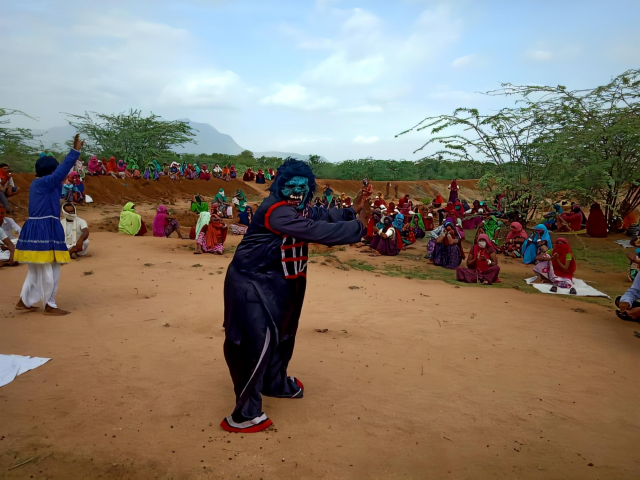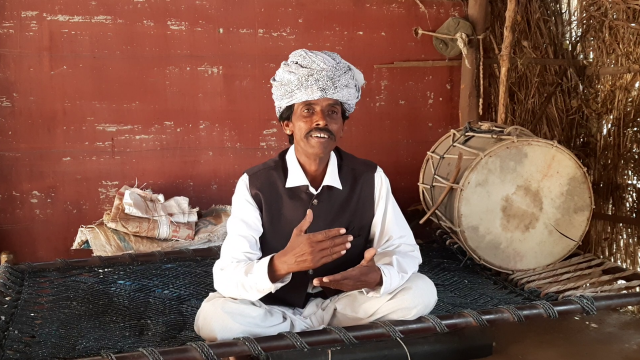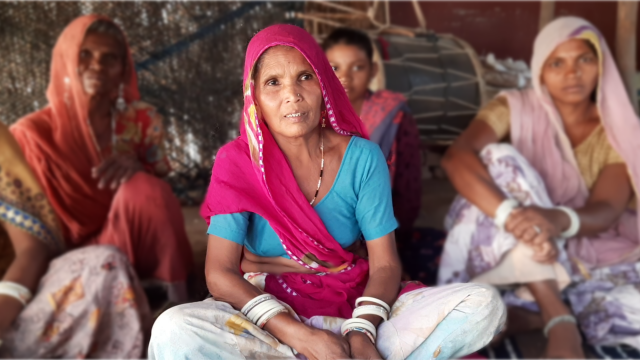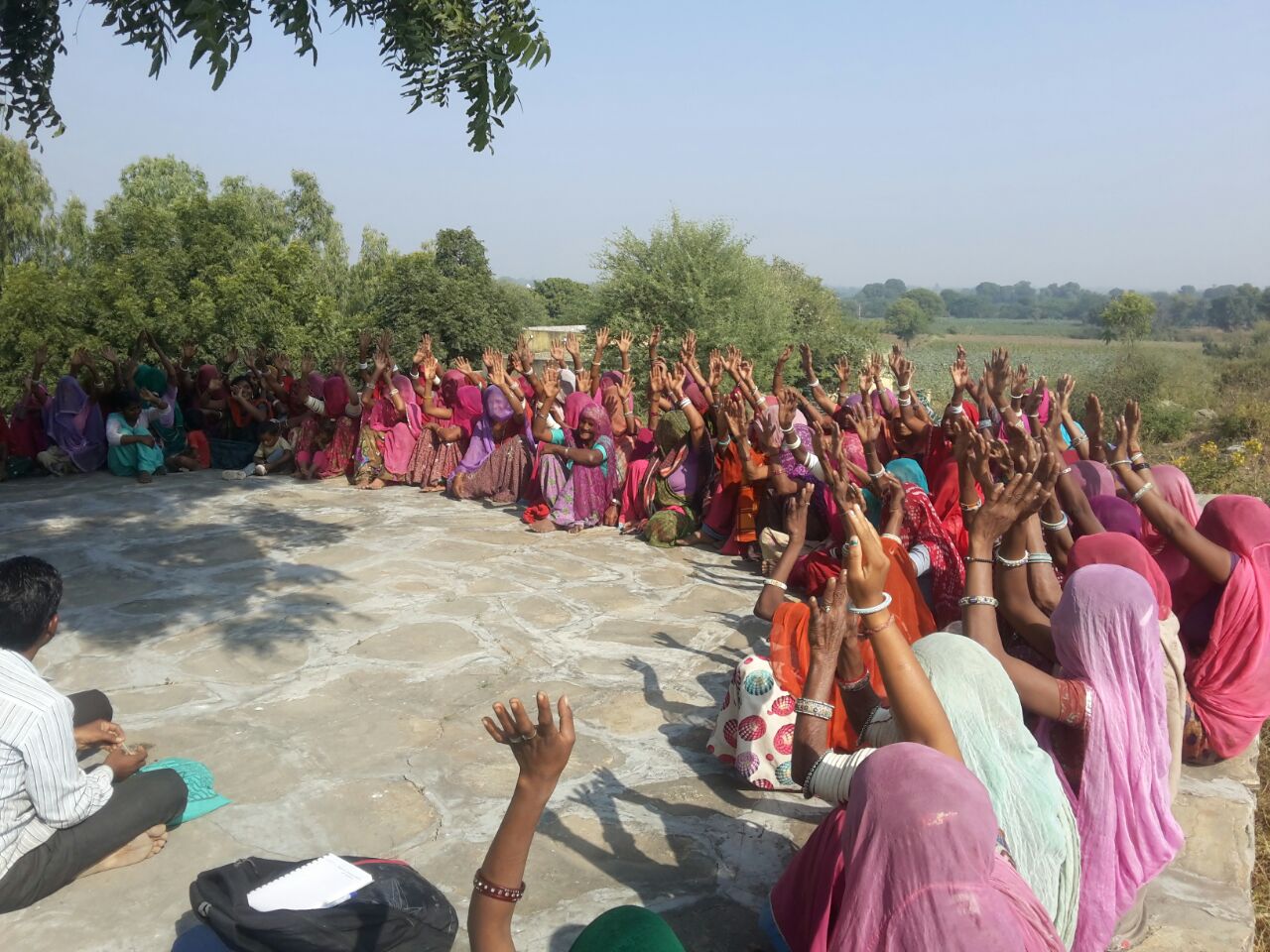Adapting Through Water and Art: Creating Ripples in Rajasthan

Located in northwest India, the state of Rajasthan is known around the world for its magnificent architecture, rich heritage, and vibrant culture that have endured and flourished over millennia. Much like songs and colourful dyes, water is deeply rooted in the local culture, playing an essential part in celebrations and festivals. However, with 5.5% of the country’s population and only 1% of its water, Rajasthan is currently one of India’s most water-stressed areas.1
The low availability of freshwater, and the resulting overexploitation of groundwater, have only worsened over the last few decades; due to climate change, rising temperatures have made the region more prone to severe droughts. In fact, over 90% of districts in Rajasthan, home to 68.8 million people (2011 census), are vulnerable to droughts. 2
Facing extreme barriers in terms of access to water, community members in Rajasthan are in dire need of answers – ones that respond to their present needs while also providing them with long-term solutions.
In 2016, the One Drop Foundation set out to address these issues through a systemic model that would provide sustainable access to water, sanitation, and hygiene (WASH) while channelling the power of art to mobilize community members toward the adoption and sustained practice of key WASH behaviours.
Six years later, the Rajasthan project has exceeded its goal of 126,500 people and improved the lives of more than 132,000 people in 200 villages across the districts of Sirohi, Pali, and Udaipur, in southern Rajasthan. As the project carries out its second phase, we look back at the strategies, achievements, and lessons learned that have made its first phase a success.
Laying the groundwork for change
Project Rajasthan integrates One Drop Foundation’s A·B·C for Sustainability™ model, which consists of three key components: Access, Behaviour Change, and Capital. To drive long-term change in communities in Rajasthan, the project made sure that investments in infrastructure were accompanied by One Drop’s Social Art for Behaviour Change™ (SABC) approach, and that a market-based methodology was developed to generate supply and demand for hygiene and sanitation solutions.
With the expertise of Centre for microfinance (CmF), the project’s executing partner, access to water and sanitation was notably improved through the construction and improvement of 20,457 individual household toilets, the installation of 237 drinking water supply systems at the community level, the installation of WASH facilities in 92 schools and 28 early childhood centres/health centres, and the development of 37 Panchayat-supported3 water schemes.
Social art: Where reality and imagination intersect
Carried out by local artists, the project’s social art activities focused on raising awareness around WASH-related issues and generating demand for WASH services. These initiatives were rooted in and paid homage to southern Rajasthan arts and culture and were typically followed by discussions with audience members, to stimulate reflection and engagement within local communities. Reaching over 300,000 people in the project areas, these activities formed the life source of the project, helping community members better understand their challenges, develop ways to support each other, and adapt to new realities.
One such alarming reality is that in the Rajasthan project’s area of intervention, the stage of groundwater development is either ‘over-exploited’ or ‘critical’4 .
As people in the region dig deeper into the earth to find water, many encounter harmful elements, such as fluoride, which can potentially lead to severe health effects. To help mitigate the risks of exposure, artists such as Nand Lal have created performances that go far beyond raising awareness around these issues.
Nand Lal, Artist
“Although there is no medicine to cure fluorosis, through our show we inform and mobilize community members to improve their dietary habits and conduct regular testing of their water sources.”

Channeling various local artforms such as songs, theatre acts, dances and puppet shows, the SABC activities around fluoride mitigation greatly motivated local community members to access safe sources of water, and to demand this from local bodies when none are available.
Kiki Bai, Project participant
“Before, we were not informed, and no one cared about the problem. Now, I have clearly understood that we should drink safe water and eat healthy to become strong and live a healthy life.”

Causing ripples in Rajasthan
Overall, the project’s social art performances received a positive response from both community members and state officials. Owing to the achievements of the project’s fluoride mitigation strategy, the CmF was invited by the State Department of Health and Family Welfare to design and implement capacity-building sessions on Integrated Fluorosis Mitigation for frontline workers, who work very closely with community members and often form the first point of care or advice in these areas.
A representative of the State Department of Women and Child Development also commended the project, in particular for its Menstrual Health Management (MHM) program, deeming it a model to be followed at the state level. The project’s MHM interventions, which included awareness-generation and capacity-building sessions, were carried out in nearly 200 villages and led to the emergence and training of four local women as Menstrual Hygiene entrepreneurs. Together, these four entrepreneurs sold a total of 14,632 reusable stitched pads to more than 7,400 women and girls.
Throughout its six years of implementation, the Rajasthan project has demonstrated that creative, context-based artistic efforts can foster people’s engagement and leadership in WASH endeavours. It has also demonstrated that, through a systems approach, WASH projects can stimulate both demand and supply of WASH goods and services for sustained results.
As seen with the fluoride mitigation strategy, local demand for safe water sources was stimulated through SABC activities, while supply came from government-supported water schemes. As for Menstrual Health Management, supply was provided by local women entrepreneurs, while awareness-generating sessions helped drive demand from local women and girls.
Overall, the systems approach to WASH issues shows promising results, with increased access to safe and improved goods and services, as well as greater uptake of WASH-related behaviours. The completion of this first phase provides fertile ground for its second phase, in which the SABC approach will soon be scaled throughout nearly all of Rajasthan’s 33 districts.
Rajasthan Phase I has created ripples that will carry on throughout Phase II, not only towards access to safe water and sanitation, but also towards climate resilience/adaptation and gender equality.
The One Drop Foundation warmly thanks its partners, Tata Trusts and Centre for microFinance, for seeing this life-changing project through to the very end.
1. Copernicus Climate Change Service
2.Council on Energy, Environment and Water
3. Panchayat is the name of the local government system in India. In simple words, a Panchayat is a council of elected representatives of a village or a group of villages.
4. The stage of groundwater development is the measure of ground water exploitation conducted periodically by the Central Ground Water Board (CGWB). The categorizations of blocks based on the stage of groundwater development are over-exploited, critical, semi-critical, and safe.
